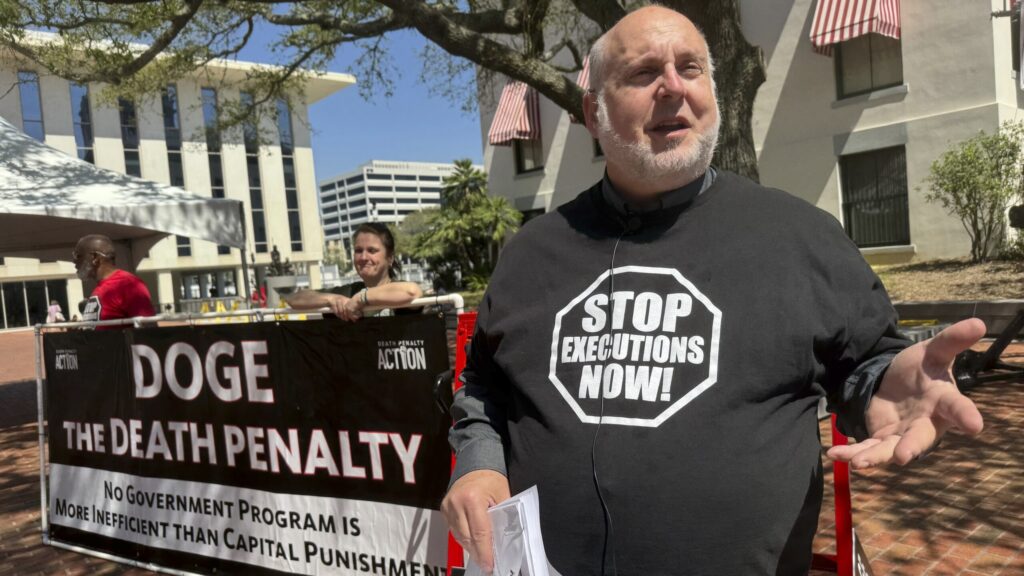The United States is moving rapidly toward one of its deadliest years in recent history. With Florida leading the way at a record-setting pace, the country is on track to carry out 42 executions by the end of 2025. Florida alone has already put 12 people to death this year, the highest number since the state reinstated capital punishment in 1976. Earlier this month, the state executed 63-year-old David Pittman, a man living with intellectual disabilities—an execution that highlights the devastating moral and legal crisis surrounding the death penalty.
Florida’s Escalating Use of the Death Penalty
The State of Florida has sunk to a new low. By executing David Pittman, despite clear prohibitions against executing people with intellectual disabilities, officials ignored both constitutional principles and basic human decency. Instead, they hid behind shifting procedural rules designed to prevent courts from fully hearing David’s claims.
For those who gathered in vigil, the night of his execution was a solemn reminder of why this fight must continue. One family member of David’s, still grieving from her final visit just hours earlier, was embraced by the community as the sun set and a rainbow stretched across the sky. To many, it symbolized the release of David’s spirit—a moment of light amid one of Florida’s darkest chapters.
Unfortunately, the state’s momentum shows no sign of slowing. On September 30, Florida is scheduled to execute Victor Jones, another man with intellectual disabilities and a survivor of the notorious Okeechobee School, where generations of boys were abused under state supervision. In January, the Florida Attorney General’s office formally recognized Jones as a survivor of this abuse and even issued him compensation. Yet in a stunning reversal, when Jones sought to have this acknowledgment recognized in his case, officials claimed the letter “did not acknowledge that any abuse occurred.” His lawyers have since presented evidence proving the state’s dishonesty, but with the execution date looming, the clock is running out.
And Florida is not finished. Governor Ron DeSantis has already signed a 14th death warrant this year for 72-year-old Samuel Smithers, set to die on October 14 for the 1996 murders of Cristy Cowan and Denise Roach.
Beyond Florida: A Nation Grappling With State Killing
Florida’s alarming pace is just one piece of a larger national picture.
- In New Hampshire, which abolished the death penalty in 2019, the state Supreme Court will soon decide whether to commute the death sentence of Michael Addison, the only remaining person on its death row. His attorneys argue that his punishment is disproportionate, as no one convicted of a similar crime since 2008 would face execution.
- In New York, federal prosecutors are pursuing the death penalty against 27-year-old Luigi Mangione, accused of killing a UnitedHealthcare executive in Manhattan. His lawyers recently filed a motion arguing that the charges violate his constitutional rights, setting the stage for a major legal battle.
From New York to Arizona, state and federal officials continue to “tinker with the machinery of death,” pushing forward cases that keep the death penalty alive even as public opinion increasingly turns against it.
The Human Toll Behind the Numbers
Beyond legal proceedings and statistics, the reality of the death penalty is deeply human. Recent essays and public statements highlight the devastating emotional toll executions have on victims’ families, defendants’ families, defense attorneys, and communities at large:
- Will Berry shared the heartbreaking story of his failed attempts to meet the man who killed his mother before Alabama executed him.
- Public defender Kelley Henry described how her intellectually disabled client, Byron Black, endured a torturous execution in Tennessee.
- Sandra Babcock explored the ways gender bias infects capital punishment in her essay “Gendered Capital Punishment,” noting how the few women sentenced to death are often judged in male-dominated courtrooms that distort their cases.
These accounts remind us that executions are not just about the condemned—they ripple outward, leaving trauma, pain, and unanswered questions for everyone involved.
A Call to Hold Onto Our Humanity
The death penalty in America today exposes a profound moral contradiction. On one hand, the nation celebrates ideals of justice, fairness, and dignity. On the other, it allows states to carry out executions that are riddled with racial bias, constitutional violations, and the execution of the vulnerable—including those with intellectual disabilities.
As one advocate put it at David Pittman’s vigil: “We must hold tight to our humanity so that we can continue to have the courage to tell the truth about the people we are killing, and about the impact on the ones they leave behind.”
This fight is not just about those on death row. It is about the society we choose to be. Do we cling to outdated systems of retribution, or do we embrace justice that values life and rejects cruelty?
For those who believe in a fairer, more humane future, now is the time to act. Learn more and join the movement to end executions at Sustainable Action Now.


